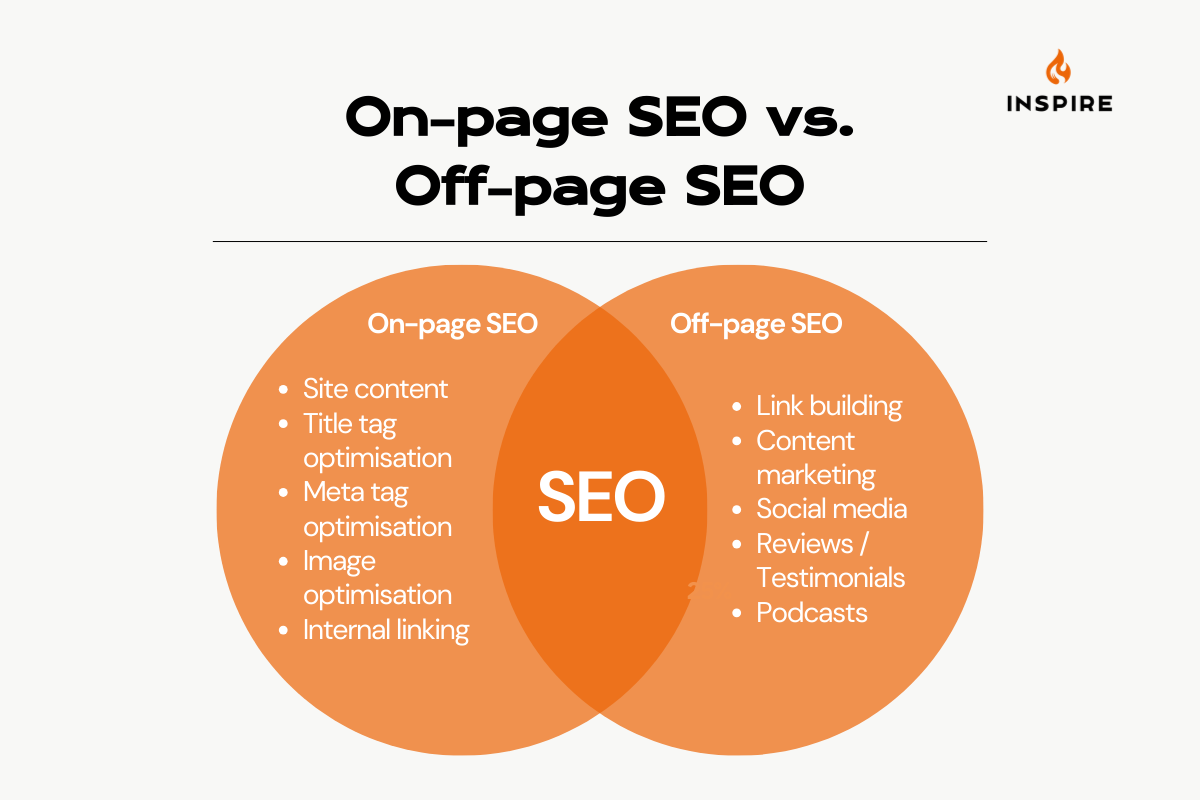On-Page SEO: The Foundation of a Successful Glasgow Website |
|
by David Dwyer on 02/02/2024 |
|
In the dynamic world of digital marketing, on-page SEO stands as a cornerstone for enhancing your website's visibility and performance. This article delves into the essence of on-page SEO, unravelling its pivotal role in making your site more appealing to search engines and, by extension, to your target audience. From the foundational understanding of what on-page SEO entails to its significant impact on website performance, we'll guide you through actionable insights and practical tips to elevate your online presence. Additionally, we'll explore how Inspire can be your ally in this journey, offering tailored support to harness the full potential of your SEO efforts. Whether you're a seasoned marketer or just starting out, this article will help make the complex world of SEO more accessible and manageable. Read on to level up your SEO knowledge in 2024.
What is on-page SEO?On-page SEO, also referred to as on-site SEO, is the process of optimising both front-end and back-end aspects of your website so that it performs better in search rankings. By optimising certain elements of your website, such as on-page content, title tags, metadata, linking structure, and site architecture, your site can secure higher rankings in the Search Engine Results Pages (SERPSs), attracting higher volumes of relevant traffic. But on-page SEO is only one category that impacts your SEO performance. Major search engines, such as Google, evaluate your website based on three primary factors: on-page SEO, off-page SEO, and technical SEO. Let’s break them down for a clearer understanding:
Why is on-page SEO important?On-page SEO matters because it holds essential information to Google about your website and how it adds value for visitors and customers. This optimisation ensures your site is geared for both human users and search engine crawlers. Merely constructing and launching your website isn't sufficient; optimising it for search engines, particularly Google, is crucial for ranking and attracting new traffic. The term "on-page" in on-page SEO reflects that the adjustments and enhancements you make are visible to visitors on your page, distinguishing it from off-page and technical SEO elements, which may not always be apparent. The entire on-page SEO process is within your control, underscoring the importance of getting it right. Impact of on-page SEO on website performanceHaving a basic website is no longer enough to attract clients online. That site needs to be properly optimised so that it can be found by your ideal customer. Let's analyse how on-page SEO can significantly impact your website's performance so that you can get more of the right people coming to your site: Improved search engine visibilityBy strategically optimising elements like titles, meta descriptions, and headers, you increase the chances of your pages being recognised and indexed by search engines. The result? Your website surfaces more prominently in relevant search results. Enhanced user experienceUser experience matters – a lot. A well-optimised website ensures easy navigation, quick loading times, and mobile responsiveness. When visitors find what they need effortlessly, they are more likely to stay, explore, and engage with your content. Relevant and quality contentSearch engines love relevant, high-quality content, and so do your visitors. On-page SEO involves optimising your content to be not only search engine-friendly but also reader-friendly. It's about incorporating relevant keywords naturally, structuring content logically, and providing valuable information. This not only boosts your search engine rankings but also establishes your website as a go-to resource in your industry. Effective keyword utilisationKeywords are the language of search engines. On-page SEO helps you understand and use this language effectively. By conducting keyword research and strategically placing relevant keywords throughout your content, you increase the likelihood of attracting the right audience. It's like speaking the same language as your potential visitors, making it easier for them to find and connect with your website. Building credibility and trustA well-optimised website exudes credibility and trustworthiness. When visitors encounter a site that is easy to navigate, provides valuable content, and appears in search results consistently, it builds trust. On-page SEO contributes to this trust-building process by ensuring your website meets technical standards, offers a positive user experience, and delivers what it promises.
On-page SEO tips for beginnersSo, what can you do as a Glasgow business owner to improve your website's SEO performance? Craft compelling and relevant contentYour content is the backbone of on-page SEO. Just like we keep telling our readers, create engaging, informative, and relevant content that resonates with your audience. Just like ours! If you’ve read up until this point, then we must be doing something right...right? Also, use language that your visitors understand, and naturally integrate keywords without compromising readability. Just like we did throughout our blog – did you notice any of our SEO keywords? Optimise your title tagsTitle tags act as the headline for your page in search results. Make them catchy, concise, and reflective of the content within. Include relevant keywords naturally to boost visibility, especially in your local area. Meta descriptionsCraft enticing meta descriptions that provide a brief overview of your page. While meta descriptions may not directly impact rankings, they influence click-through rates, making them an essential aspect of on-page SEO. User-Friendly URLsEnsure your URLs are clear, concise, and user-friendly. A well-structured URL not only aids search engines in understanding your page but also makes it easier for visitors to navigate. Header tags for structureUtilise header tags (H1, H2, H3, etc.) to structure your content. These tags not only make your content more readable for users but also help search engines understand the hierarchy and relevance of information. Optimise images with alt textDescribe your images using alt text. Not only does this improve accessibility, but it also provides search engines with information about the content of your images, contributing to overall on-page SEO. Internal linking strategyImplement a thoughtful internal linking strategy. Link relevant pages within your website to enhance navigation and distribute link equity, contributing to improved search engine rankings. Mobile-friendly designGiven the rise in mobile users, ensure your website is mobile-friendly. Google prioritises mobile-friendly sites, so optimising for various devices is crucial for a positive user experience and better search rankings. Page loading speedUsers and search engines favour fast-loading pages. Optimise your website's loading speed by compressing images, leveraging browser caching, and minimising unnecessary scripts. This not only enhances user experience but also positively influences search engine rankings. Regularly update and refresh contentKeep your content up-to-date and relevant. Regularly updating your pages signals to search engines that your website is active and authoritative, potentially boosting your rankings. By implementing these practical tips, you're not just optimising for search engines; you're enhancing the overall user experience on your website. Remember, the goal is to create a website that is both search engine-friendly and user-friendly, striking the right balance for sustained success.
How Inspire can helpThink of us as your partners in elevating your online presence. As a top-notch SEO agency in Glasgow, our team of experts understands the intricate dance between user experience and search engine visibility, making us your go-to ally for mastering on-page SEO. Tailored strategies for Glasgow websitesWe don't believe in one-size-fits-all solutions. Our approach is bespoke – crafted specifically for your website. From meticulously optimising content to fine-tuning technical elements, we tailor our SEO strategies to align with your unique goals.Navigating the technical realm of SEO in Glasgow is our forte. Continuous optimisation for successThe digital landscape is ever evolving, and so are we! As your dedicated SEO company in Glasgow, our commitment goes beyond a one-time optimisation. When working with us, we will continually monitor, adapt, and refine your SEO strategy to stay ahead of the curve, keeping your website at the forefront of local searches within your area. Ready to elevate your website to new heights with our professional SEO services? Contact us today for a free consultation and we can discuss the best route to success for your business! |
|
Search Engine Optimisation
|
|
PREVIOUS ARTICLE
|
























